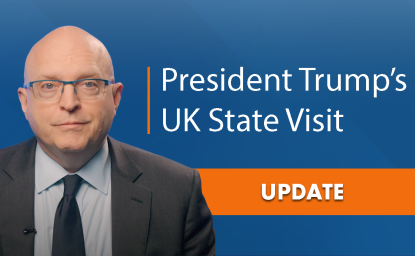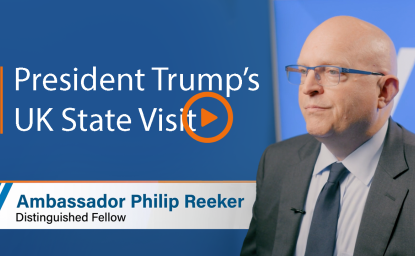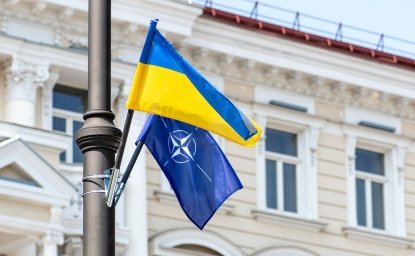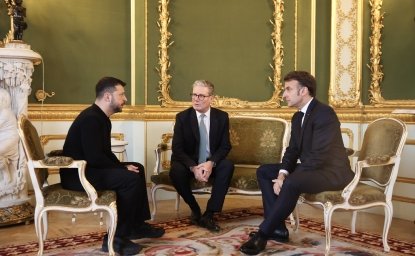On October 28, Prime Minister Sunak announced that the failure of Northern Ireland’s Democratic Unionist Party (DUP) to share power with Sinn Féin requires the calling of an election on December 15. This fulfills a legislative obligation under the Good Friday Agreement of April 1998 that required a fully functioning ministerial executive to rule Northern Ireland. The majority party should share power with the 2nd winner. For 24 years shared governance between Sinn Féin, the republican party associated with the Provisional Irish Republican Army and the DUP has ensured stable governance, reduced violence and provided prosperity throughout the Irish isle, justifying the continued US support for the Good Friday Agreement. After losing to Sinn Féin in the May 2022 elections, the DUP refused to share power. Few doubt the December outcome will be different from that of May.
DUP’s leader Jeffrey Donaldson has remained adamant that he will not share power until the Brexit Protocol is withdrawn and trade between Northern Ireland and Britain resumes without custom checks across the Irish Sea. Donaldson and his followers insist that they remain fully integrated with Britain and must therefore be treated on equal terms with the rest of England, Scotland, and Wales.
The new Prime Minister has two priorities: stabilizing the British economy and unifying the Conservative party. Pursuing a stable economy requires continuation of the 2021 Trade and Cooperation Agreement with the European Union. This includes the Protocol -- which was an ambiguous agreement to check goods coming into Northern Ireland from Britain in order to prevent goods entering the European market (Ireland) through a back door. Boris Johnson promised to tear up the Protocol. But his words had terrible consequences. The UK would break international law and the EU has promised to re-impose tariffs on British goods, including its exports of automobiles and automobile parts. These measures would severely hurt the UK’s automobile industry.
Furthermore, signing and then tearing up an international treaty would undermine the UK’s reputation as a reliable party. The new government seeks to restore steadiness and perception as a reliable partner. After the political chaos of the last 6 weeks, repair is needed, not further wreckage.
The Prime Minister’s second priority is to unify his party – a deeply divided group of 357 MPs and approximately 172,000 registered members throughout the UK, amounting to 0.3% of the population. Within the Parliamentary Conservative party is the European Research Group (ERG) a group dedicated to research and coordinated activity, whose former chairman, Chris Heaton-Harris, is now the Secretary of State for Northern Ireland. They remain staunch Brexiteers, committed to completing the separation between the UK and the EU. Sunak needs to keep ERG members within the Conservative fold. He faces their challenge on two counts: the Protocol bill and the Omnibus bill to revoke or repeal any EU based regulations in UK law.
Former Prime Minister Boris Johnson introduced a bill to withdraw from the Protocol under its Article 16. Parliament has held 3 readings of this bill which has moved to the House of Lords for their approval. However, several of their Lordships have stubbornly refused to move the bill forward.
The day before her mini-budget, PM Truss introduced the Retained EU Law (Revocation and Reform) Bill. This bill would remove the principle of EU law supremacy, which currently means that EU law trumps domestic legislation where there is a conflict. It repeals or revokes any EU based regulations in UK law, unless they are specifically preserved and incorporated into UK law. All of this is to be accomplished by 31 December 2023 with a potential extension until 2026. This mammoth omnibus bill would affect 2,400 laws passed in compliance with EU regulations over the last 30 years, covering workers’ rights, aircraft safety standards, free TV access to major sporting events and wildlife habitat protection. Sunak now must decide whether and how to amend this omnibus bill. The business community is anxious about the prospect of chaos that dropping EU regulations would mean and the Trade Union Congress, together with human rights and environmental groups, have joined in opposition to the bill.
Sunak must balance these competing pressures. He has indicated a willingness to negotiate with Brussels over the Protocol while at the same time pursuing the procedures set out in the Good Friday Agreement. He can ride both horses for a while. His problem will be the anticipated violence in Northern Ireland as DUP hardliners clash with youth in the pro-Irish republican Sinn Féin. Violence would not help negotiations between Westminster and Brussels.
Sunak can also balance the pro-Europeans a.k.a. Remainers in his party who believe that future prosperity depends upon access to the European market with the ERG by prolonging discussions on which regulations to revoke. He can call for amendments to the regulations not rescission. This process could take years but would assure both sides that their concerns are being taken into account.
The way ahead is politically treacherous. In response to the Secretary of State's decision to call the election, Northern Irish citizens on both sides of the aisle are expressing anger. They ask for a responsible government able to deal with the cost of living crisis. "We need politicians to put their heads together to help solve things." On the Protocol bill, Brexiteers are insisting on Article 16. Sunak faces opposition and will need all his intelligence and persuasive powers to hold his government and Northern Ireland together.
Author


Global Europe Program
The Global Europe Program is focused on Europe’s capabilities, and how it engages on critical global issues. We investigate European approaches to critical global issues. We examine Europe’s relations with Russia and Eurasia, China and the Indo-Pacific, the Middle East and Africa. Our initiatives include “Ukraine in Europe”—an examination of what it will take to make Ukraine’s European future a reality. But we also examine the role of NATO, the European Union and the OSCE, Europe’s energy security, transatlantic trade disputes, and challenges to democracy. The Global Europe Program’s staff, scholars-in-residence, and Global Fellows participate in seminars, policy study groups, and international conferences to provide analytical recommendations to policy makers and the media. Read more

Explore More
Browse Insights & Analysis
Update: Ambassador Reeker on President Trump’s UK State Visit

Ambassador Phil Reeker on President Trump's UK State Visit

Europe Scrambles to Bolster Defense in the Aftermath of US Pausing Support for Ukraine

